- Home
- Raymond Benson
The Black Stiletto Page 20
The Black Stiletto Read online
Page 20
It was a good thing I saved up a bunch of money to take with me. Since I didn’t know how to drive a car—I never learned!—I was going to have to take taxis everywhere. No public transportation like buses and subways in Odessa. Well, there were buses, but not like what I needed. I also couldn’t remember too many things about the town’s geography, so I bought a map at the airport before going outside and finding a cab. Even the taxis were hard to come by—I had to get someone to call one to take me to town. The airport was situated in the middle of nowhere, between Odessa and Midland.
A nice Mexican man named Luis picked me up. I gave him my false name—Eloise—and told him I’d like to hire him for a couple of days to be my personal driver. He’d never heard of an arrangement like that. His English wasn’t great, but we understood each other all right. He said he’d have to check with his boss at the taxi company he worked for to find out what it would cost.
In the meantime, I paid him for a ride to the west side of Odessa, which is where I used to live with my mom and brothers. Whitaker and 5th Street. Once we got into the city, it all came back to me, even in the dark. I’d forgotten, though, how close we were to the railroad tracks that separated white Odessa from “colored town.” When I was growing up, there was a creepy mystique about the south side of Odessa, an area of nothing but shanties where all the Negroes lived. Whenever my brothers and I were upset about how poor we were, John or Frankie would say at least we weren’t as bad off as them. After living in New York and working in a gym where Negroes and whites trained in the same room together, I realized how prejudiced the rest of the country is. Odessa was no different. I guess I grew up with the concept of prejudice instilled in me, too, but now I see it’s all so wrong. Not much I can do about it, though.
I had Luis drive by the old house. Imagine my shock when I saw it wasn’t there anymore. Several homes on the street had been torn down and new ones were being built. It’s not surprising. My old house wasn’t much better than the shanties across the tracks. Well, obviously, my mom didn’t live there. I guess I had some detective work to do to find her.
Luis dropped me at a motel on 2nd Street and waited while I checked in, again using a false name. I asked him to call for me tomorrow morning at nine, regardless of what his boss told him about me hiring him for a couple of days. Luis said not to worry, he’d be there.
Now I’m settled in, about to go to bed. It’s nearly midnight and I have very mixed emotions about being back in Odessa. Seeing that street disturbed me. I know I haven’t thought much about my mother and brothers since I ran away from home. I guess I’m feeling guilty about it, and I had a good cry a few minutes ago. I considered going down the street to a bar and get a drink, but I’m afraid people would think I’m just some floozy. So instead I’m staying in.
Perhaps tomorrow will bring some answers.
DECEMBER 12, 1958
Dear diary, I’ve had a very emotional day. Luis picked me up this morning, as promised, and told me he could be my driver for ten dollars on a daily basis. I thought that was all right, so I hired him. Did I mention he was a chain-smoker? He lit one after another the entire time I was with him. I had to keep my windows down a bit to air out the car. I didn’t mind too much. Like I said before, everyone in New York smoked, too. I was getting used to the smell.
First I had him take me to Odessa Junior High School. He waited in the parking lot while I went inside. It hadn’t changed much. The halls were still full of kids from lower-class families. They didn’t look any happier than I’d been. I tried to imagine myself back there, walking with my books in hand, going to gymnastics, and reading books in the library. For some reason, the image wouldn’t form properly in my head. It figures, I guess. I’ve moved on. I’m just not the person who once roamed those corridors and classrooms. Even though it was only seven years ago, it was really a lifetime.
In the office, I asked about Mr. and Mrs. Douglas Bates. I didn’t tell them I was the prodigal daughter. They looked at me like I was crazy. Why would they have any information on a couple if their child didn’t currently go to the school? I realized they were right, so I left the building. That was dumb on my part.
So I went to our old church. It was the First Christian Church, on Lee. We didn’t go very often. Mom dragged us kids there for Easter every year and occasionally on some Sundays. We hated it. I never took to Sunday school and I especially fidgeted during actual services. But we were members, so I thought maybe they’d have some records.
A nice lady in the church office remembered my mother, but hadn’t seen her in a long time. She didn’t ask who I was; I just said I was a relative and wanted to find out where Mr. and Mrs. Douglas Bates might be. She couldn’t find a listing in their directory, so she went into another room to ask someone. When she came back, the lady had a look of concern on her face. I immediately felt a surge of extreme sadness. My intuition foretold what she was about to say.
“I just heard from our church secretary that Mrs. Bates—her name was Betty, right?”
“Yes, ma’am.”
“Well, Mrs. Bates passed away three years ago. Caught the cancer, she did. Died in nineteen fifty-six.”
The news took my breath away, even though I half expected it. Before I could no longer stop myself from crying, I had the presence of mind to ask about her husband and sons. She didn’t know anything about Douglas or where he might be. However, she told me Frank Cooper lived in town and was, surprisingly, still a member of the church. At first, the lady hadn’t connected Frank with the name Betty Bates. She said he worked at a hardware store on 8th Street. I thanked her and went outside to Luis and the cab.
In the car, I broke down and cried my eyes out. My mama was dead. And I’d run away from her, probably when she needed me the most.
I found Frank at the hardware store on 8th Street, not far from Dixie Drug, a pharmacy and deli where my brothers bought comic books when they were little. You shoulda seen his face when he realized who I was. At first he didn’t. I recognized him as soon as I walked in. He wasn’t as tall as me—he never was, ha ha—but he’d filled out and was all grown up. Still had a baby face, but there was also something wrong with his right eye. When I was up close I could see the problem—it was made of glass. He’d somehow lost his eye since I’d last seen him.
Anyway, I spotted him behind the counter. He was helping a customer with some tools or something. I waited patiently for my turn, and then he looked at me and asked, “May I help you, miss?”
“You sure can. I wonder if you might have time to play a little “Americans vs. Japanese” when you get off work.”
“I beg your—” And then his jaw dropped. I couldn’t help but laugh.
“Judy?”
“It’s me, Frankie.”
“Oh my God, Judy!” He was too shocked to move.
“You gonna give me a hug?” I held out my arms, he practically leaped from behind the counter, and we embraced. It felt great.
“Where—oh my God, Judy—where have you been? Where did you go? We were so worried about you!”
“I know. And I’m sorry. Listen, when can you get a break? I’d love to sit and talk.”
His head went up and down, taking in my entire body. “Judy. Holy cow. You’re a woman now. You’re gorgeous ! Oh my God, my sister is a beautiful young woman!”
“And I’m smart, too,” I said. “When can you take a break?”
“Right now. Just a sec, lemme find someone to watch the counter.” He ran to the back of the shop, stuck his head through a door, said something, and came hustling back. After a moment, another man—older, probably senior in position—followed him out.
“Ray, this is my sister Judy,” Frank said.
“Pleased to meet you, ma’am,” the older man said. He, too, seemed to be taken by my appearance. I guess I did turn some heads, but I never thought about it much.
“Come on,” Frank said, gesturing me toward the front door. “There’s a coffee shop a couple doors down.
You feel like walkin’?”
“Sure.”
I stopped at the taxi to tell Luis what I was doing. He was happy to wait. I think acting as my driver made him feel important somehow. He thought I was some high-class businesswoman from New York.
Frank and I sat and ordered coffee at this cute little place full of blue-collar folks on their breaks, smoking their cigarettes and having coffee. A waitress with a thick Texas accent took our order. I’d forgotten how much of a drawl people had, and I imagine mine came back full force once I landed in the state.
“I can’t get over how good you look,” Frank said.
“You look good, too, Frankie, but, my Lord, what happened to your eye?”
He winced and replied, “Oh, that’s a long story. But first, Jesus, Judy, tell me what happened to you. You can’t imagine, well, Mom was real upset when you ran off. We thought you were dead. We had the sheriff and the police and everyone lookin’ for you. We were goin’ crazy.”
Hearing this made me want to cry again. “I’m sorry, Frankie. I really am. It’s just—I had to get away. Because of—you know. Him. Douglas.”
At the mention of the man’s name, Frank stiffened. He looked away and then nodded. “Did he hurt you? Do something to you?”
“Yeah. He did. It was bad, too.”
“What happened?”
So I told him enough that he’d get the picture without going into the gory details. “I was so young, Frankie. I was afraid to tell anyone. He threatened me. Said he’d make it sound like it was all my fault.”
“That’s bullshit.”
“I know that now. When I was thirteen I didn’t.”
“I’m sorry that happened to you, Judy.” He looked away. “Douglas is the reason I have a glass eye.”
“What?”
“It wasn’t long after you left. Maybe three or four months. Mom was in bad shape, drinking all the time, really unhappy. Douglas went on binges and beat her when he could, and if she was already passed out then he’d beat me. One day we were in the kitchen. He had an ice pick, chippin’ away at a block of ice for the fan ‘cause it was startin’ to get hot outside. Anyway, he just got through yellin’ at Mom for somethin’ and I hollered right back at him. I told him to get out of our house. He meant to slap me, but the ice pick accidentally flew out of his hand. Judy, that thing hit the ceiling and then fell, just as I was lookin’ up at it. Landed right in my eye. It was a freak accident, but I still blame him. Went to the hospital, and now I’ve got this crappy glass eye. I hate it. I look like a freak.”
“No, you don’t, Frankie. I hardly notice it.” It was a white lie, but I had to say it.
“Thanks for sayin’ that, Judy, but I know you’re fibbin’. The only good thing about it was it got me out of military service.”
“Oh, that reminds me, what about John? Where is he?”
“He’s still in the army. I guess he likes it, ‘cause he never left once he joined. He’s makin’ a career out of it. He’s an officer, stationed at Fort Sam Houston in San Antonio.”
“Well, I’ll be. Are you in touch with him?”
“A little. Not much. He came back for Mom’s—oh my God, Judy! Do you know?”
“About Mom? Yeah, Frankie. I know.”
“How did you find out?”
“A lady at our church told me today.” I felt tears welling up in my eyes; I couldn’t help it. “I’m sorry, Frankie. I shoulda been here. I feel so bad.”
He reached out and touched my hand on the table. “I think she woulda liked to see you again.”
That did it. I started bawling all over again. Frank was a dear and got me some tissues. He was crying a little bit, too. This entire trip had turned into nothing but a series of waterworks. But I settled down after a while and he told me a little about her final days. In 1954 they had moved to an apartment on the far northwest side of Odessa, out closer to the oil fields. She’d gotten a job as a secretary at one of the parts companies and wanted to be near work. When Frank graduated high school, he moved out and immediately started making his own living. He had no desire to go to college, and besides, neither he nor Mom could afford it. Her illness came on suddenly and advanced quickly. Apparently during the last three months of her life, Douglas just upped and left. Abandoned her when she needed him the most.
Finally, after Frank told me where Mom was buried, I asked the question. The reason I’d come to Odessa. “So, where is Douglas now?”
Frank made a face. “I don’t know and I don’t care. I hate him.”
“Is he still in Odessa?”
“Hell, I don’t know. Far as I know. After Mom died, he sold the house and left. We never heard anything more about him. He just disappeared from our lives. Good riddance. What a son of a bitch. Pardon my language, Sis.”
“That’s okay. I’ve cursed him myself. I really want to find him, Frank.”
“What for?”
“I just do. He and I have some unfinished business.”
“Judy, don’t be stupid.”
“I know what I’m doin’, Frankie. Can you find out where he is?”
“Well, actually the last I heard he was still workin’ as a roughneck out in the oil fields. Near Goldsmith. You know where that is?”
“Vaguely. It’s a little-bitty place outside of town?”
“About fifteen or twenty miles away; you go out Kermit Highway, and then turn north on a ranch road to Goldsmith. Smack dab in oil field country. It ain’t much to speak of.”
“You think he’s still there?”
“Hell if I know. Like I said, I could care less. I hope he falls in an oil well and drowns in it. What a mean, spiteful, horrible person.”
“I couldn’t agree with you more.”
We talked a little longer, but then it started feeling strange. I don’t know why, but I suddenly got real uncomfortable. Like I didn’t belong. I was a stranger in my own hometown. I decided to end our visit, so I looked at my watch and told Frank I had an appointment.
“Will I see you again?” he asked.
“I don’t know. Why don’t you give me your address and phone number?” He did, but I didn’t return the favor. I suppose he must have sensed I was a very private person now. We said goodbye back at the hardware shop. I told him I’d call before I went home, but I knew I probably wouldn’t. I hadn’t told him anything about my life in New York, and he never asked. In fact, I don’t think I ever said I lived there. Frank doesn’t know where to find me.
It’s probably best that way.
It was getting dark, so I had Luis drive me to the cemetery where Frank said Mom was buried. It was the Ector County one, just south of the tracks on Dixie, so it wasn’t very far from the hardware store. It was probably the oldest cemetery in Odessa, but I’m not sure about that. The place was closing in less than a half hour, so I had to hurry.
I left Luis in the car and found my way through the gravestones until I located the place where my mother now rested. The stone read: ELIZABETH WALDEN COOPER, BELOVED MOTHER. I was glad to see my father’s last name on it. Had that been Frank or John’s decision? Perhaps my mother requested it before she passed on. I have no way of knowing, but it felt right. Dad’s body was never recovered from the Pacific Ocean, so he had no burial site. It’s a shame.
Standing there, looking at the headstone, I cried for the third time that day. I was overcome with guilt for running away from home and not sending word back to my mother that I was all right. I’d caused her unnecessary worry. At the time, I supposed I despised her for putting up with Douglas and being blind to what he was doing to her, to me, and to my brothers. I hated her alcoholism. To me, she was a weak and pathetic person—drowning her sorrows—our sorrows—with a bottle and then spending days in bed. Now, though, I see it was the only defense mechanism she had. Those were tough times, especially after my dad was killed. Mom sacrificed a lot, demeaning herself to be a cleaning lady for women who were better off than she. She was dealing with so much—and then I had to r
un away. Yes, it was something I had to do to get away from the monster that lived in our house. But I guess I could have done it a little differently.
“I’m sorry, Mama,” I said out loud. Tears ran down my cheeks as I spoke. “I hope you didn’t worry too much. I shoulda told you I was safe. I guess I was afraid you’d have the authorities come and bring me back here if you knew where I was. And I’m sorry you died of cancer, Mama. You know it was Douglas who was the cause of it all—my leaving, your cancer—yes, I’m sure Douglas brought that disease on you. He is malignancy itself, a devil who has no right to walk this earth while you lay buried in it. I’m gonna make him pay, Mama. I promise you that.”
I felt a presence watching me; I turned and saw the cemetery keeper standing by the gate. Closing time. I had to go.
Looking back at the grave, I had nothing more to say, except, “Goodbye, Mama. I love you. I really do.”
Then I wiped the tears off my face and walked back to the taxi.
“Where to, Miss Eloise?” the driver asked.
“Luis, how would you like to make a few extra bucks and keep working tonight?”
He smiled broadly and nodded eagerly. “Sí, sí!”
“Good. Take me back to my motel, and then we’ve got some things to do.”
The Black Stiletto was going to visit Goldsmith, Texas.
32
Martin
THE PRESENT
It’s been a lousy couple of days. I went in to work yesterday and today, and tried to act like I cared. Brad avoided me at all costs. Nancy had heard the real reason why I didn’t stay at the office on Monday, so she was suitably sympathetic. It’s weird when a company gives you two or three weeks’ notice—in my case, a whole month—because you don’t really feel much like working for a firm that’s just fired you. You’d think they’d know that. Nevertheless, I thought I’d give it my best shot until I found another job. Maybe I could leave before the month was over. I hadn’t done much to look for a new job, though.

 The James Bond Bedside Companion
The James Bond Bedside Companion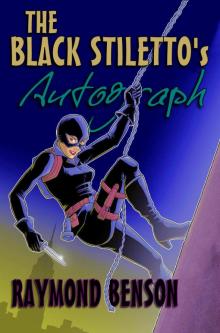 The Black Stiletto's Autograph
The Black Stiletto's Autograph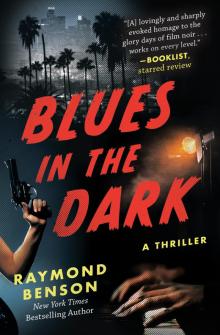 Blues in the Dark
Blues in the Dark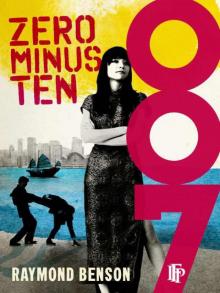 Zero Minus Ten
Zero Minus Ten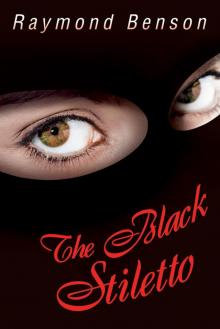 The Black Stiletto
The Black Stiletto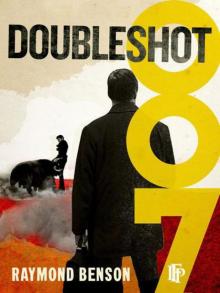 Doubleshot
Doubleshot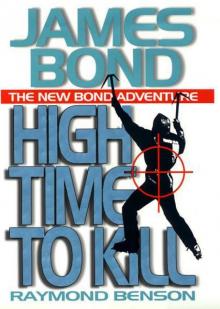 High Time To Kill rbb-3
High Time To Kill rbb-3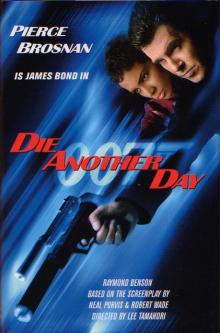 Bond Movies 07 - Die Another Day
Bond Movies 07 - Die Another Day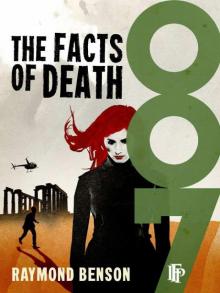 The Facts Of Death
The Facts Of Death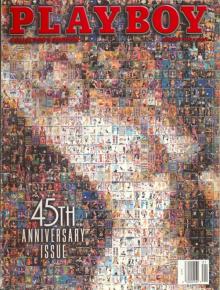 Midsummer Night's Doom
Midsummer Night's Doom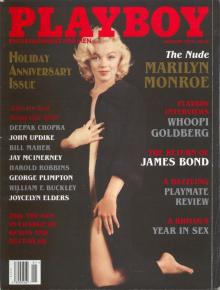 Blast from the Past
Blast from the Past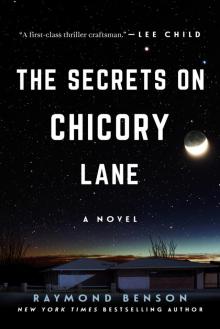 The Secrets on Chicory Lane
The Secrets on Chicory Lane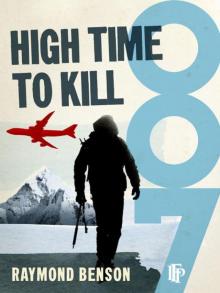 High Time To Kill
High Time To Kill The Black Stiletto: Black & White
The Black Stiletto: Black & White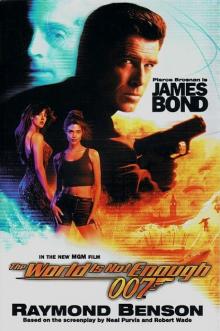 The World Is Not Enough jb-1
The World Is Not Enough jb-1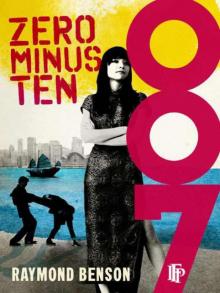 Zero Minus Ten rbb-1
Zero Minus Ten rbb-1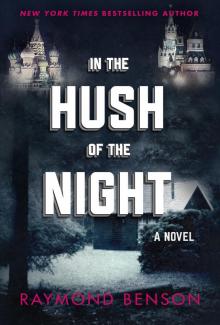 In the Hush of the Night
In the Hush of the Night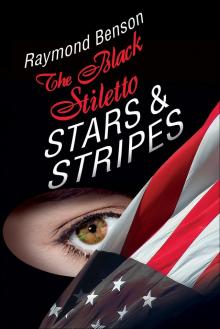 The Black Stiletto: Stars & Stripes
The Black Stiletto: Stars & Stripes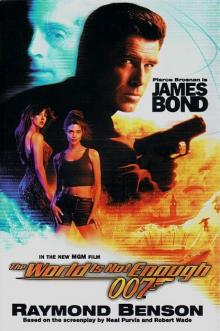 Bond Movies 06 - The World Is Not Enough
Bond Movies 06 - The World Is Not Enough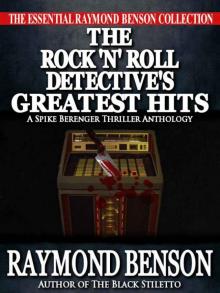 The Rock 'n Roll Detective's Greatest Hits - A Spike Berenger Anthology
The Rock 'n Roll Detective's Greatest Hits - A Spike Berenger Anthology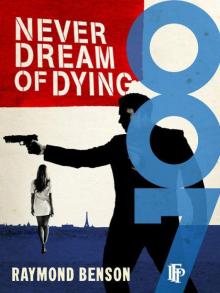 Never Dream Of Dying
Never Dream Of Dying